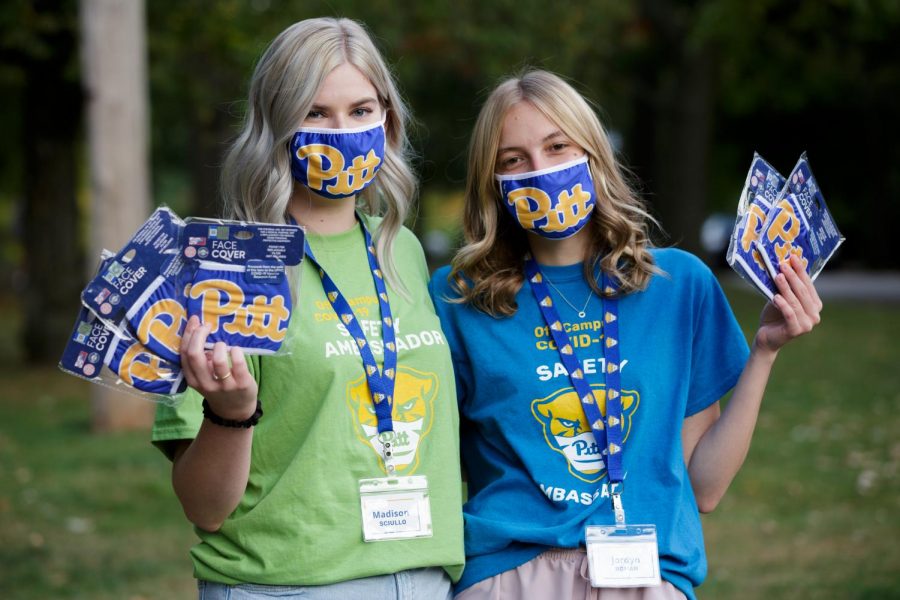‘A professional narc’: Pandemic safety ambassadors navigate Oakland’s streets
Thomas J. Yang | Senior Staff Photographer
Madison Sciullo (left) and Jordyn Roman (right) are two of the 280 student employees working as pandemic safety ambassadors.
October 12, 2020
Maria Lucy can be found traversing Oakland’s streets during the week, talking to members of the Pittsburgh community about COVID-19 and sharing resources, such as masks and hand sanitizer. She said her job is educating people when they need it, and reporting them when they don’t listen.
“I’m a professional narc,” Lucy, a senior Japanese major, said. “But in a good way.”
Lucy is one of the 280 student employees currently working as pandemic safety ambassadors. As an off-campus student, Lucy said she walks around her sectioned area around Oakland. Educating and listening to members of the Oakland community, the pandemic safety ambassadors are Pitt’s eyes and ears on the ground to see how people have adjusted.
“I’ve been feeling so disconnected to the Pitt community — I’ll drive by when I’m going home and remember, ‘I used to do this’ or ‘I used to live here,’” Lucy said. “I saw this as an opportunity to feel like part of the community again and inform the Pitt community on why they need to be wearing masks.”
Based on where students already live, they can have two-hour shifts for 10 to 15 hours a week in their respective Oakland territories, including Oakland Square, Bellefield and Oakcliffe. University spokesperson Pat McMahon said the program is currently scheduled to run through the fall semester, with a good possibility that it will continue in the spring to support the health and safety of the Pitt community.
The pandemic safety ambassadors are part of a larger pandemic safety network, made up of staff, faculty and students. He said faculty and staff were asked to volunteer, while students were offered paid positions.
Madison Sciullo, a junior business information systems and finance double major, said she saw a post about the pandemic safety ambassador job on Pitt’s Twitter account and decided to apply to further her involvement in the Pitt community.
“Living off campus, we don’t have to abide by as many restrictions as students living on campus,” Sciullo said. “I thought it was a good way to provide some safety for people living off campus and talk to people in the community to see how they were feeling.”
Along with her friend Jordyn Roman, a supply chain management and business information systems double major, Sciullo walks around and asks people how they’re feeling and if they have any questions for the ambassadors about COVID-19. They also ensure the community is participating in one of the most important facets of pandemic safety — mask-wearing.
“If they’re wearing a mask, we thank them for contributing to good safety measures,” Sciullo said. “If they’re not wearing a mask, we offer them one. If they’re wearing one incorrectly, we’ll correct them. Rarely, people decline, but we still explain that masks prevent the spread of the coronavirus, and it’s required you wear one if you’re on campus.”
After each shift, Roman said ambassadors are required to complete a report with details from the shift.
“We fill out a report to keep track of how many people were wearing a mask, how many weren’t, and if they weren’t, were they a member of the Pitt community?” Roman said. “We also note if there were any questions we answered or weren’t able to, and if so, where we referred them to.”
Sciullo said the pandemic safety ambassadors are able to answer these questions because of the extensive training they received. She said the training featured speeches by Vice Provost and Dean of Students Kenyon Bonner, UPMC physicians and Lexie Elliott, the head of the program and assistant director of fraternity and sorority life.
“We completed a training over Zoom where we also met with our team leaders and fellow ambassadors,” Sciullo said. “The speakers told us about [COVID-19 infection] statistics in the Oakland area, and we were trained on different scenarios when it comes to interacting with different types of people.”
But the training does not end there — Students are required to read news articles and keep up-to-date on Pitt’s coronavirus response, according to Lucy.
Sciullo said working in retail has prepared her well for these customer service-like interactions.
“We read a training manual and completed a practice scenario quiz,” Roman said. “They had prompts, like if you saw 30 people hanging out together, what would you do? We also fill out reports if there is anything concerning we see happening in the area.”
While ambassadors give resources to the community, McMahon said they are properly equipped with hand sanitizer, disinfectant, spare face coverings and signage.
“Ambassadors are given hand sanitizer, disinfectant, spare face coverings and signage reminding them to maintain proper physical distancing and practice additional safety measures like frequent hand washing and proper use of face coverings,” McMahon said.
Roman said ambassadors can also be recognized by their distinct uniforms, which include bright shirts and a drawstring bag with materials.
“If you live off campus, you’ll definitely see people within your region walking around in our ambassador shirts,” Roman said.
Sciullo said another important part of the job is sharing her experiences on social media. She said ambassadors are required to make three posts a week. One is about the job, another is about resources available to students from Student Affairs or a message from Bonner and the third is about mental health.
McMahon said students and volunteers are encouraged to provide suggestions through Microsoft Teams app or email.
Sciullo said the program was a great opportunity, and she is excited to continue spreading awareness about the COVID-19 pandemic in her community.
“Knowing about the virus is so important, but many people don’t want to talk about it,” Sciullo said. “I hope we can provide some safety to people in the Pittsburgh community.”








